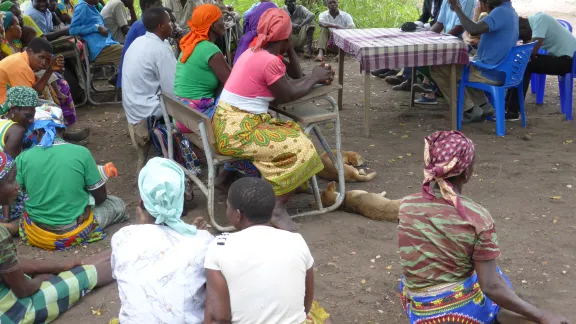
LWF staff collect information about human rights concerns at a village in Mozambique. Photo: S. Oftadeh
“A responsibility to ensure the evidence we collect is robust”
The review, known as the Universal Periodic Review, is a mechanism run by the UN Human Rights Council in which states review each other’s efforts to improve human rights every four years.
At a recent meeting of NGOs in Maputo, the LWF was one of five organizations nominated to form a steering committee that will lead 20 organizations investigating human rights in the sectors of education, gender, land rights, public and political participation, and freedom of expression.
As well as holding community consultations, LWF staff in both Geneva and Mozambique will work with Mozambican authorities and key local organizations, such as the Human Rights League of Mozambique, a major civil society organization in the country.
The review will make public the steering committee findings, as long as the findings are formatted correctly and based on first-hand evidence. Once made public, states can include the data in their national reports.
LWF Mozambique country representative Katja José said it was an honor to support the people of Mozambique in their struggle to have their rights recognized. “We now have a responsibility to ensure the evidence we collect is robust and truly reflects the human rights situation in the country.
“The greatest challenges in this process will be to gather inclusive information reflecting the greatest concerns of the poorest and marginalized, in a setting where civil society is fragmented. There are unmet needs in almost every sector.”
Crops ruined by big business
In recent years, Mozambique has been the scene of increased land conflict as national and international companies benefit from deals that block the ability of local communities to farm.
In 2005, a livestock company settled 10km from a village in the Sofala province of Mozambique. However, village residents were denied the chance to negotiate conditions that would have protected their livelihoods. Every year since, cattle have been left to graze the community farm land, destroying crops in the process.
“Before this company arrived, life was good here,” says Paulo, head of the committee that encourages development in the village.
Residents used to benefit from two harvests but for the last decade, cattle have been systematically destroying the second. In 2013, the community tried to complain to the company but never received a response. They are seeking compensation for lost income.
Victoria speaks for the women of the village. “We used to cultivate beans, sweet potatoes, onions and tomatoes. We would sell them and use the money to bring the corn to the grinding mill.”
Paying the mill to do the job would free time for other activities. Now they can no longer afford to go to the mill and have to grind the corn themselves. “The whole process is broken. The women of the village are suffering.”
Examples and testimonies from the local population show that community consultations required by law are not taking place; land deals often take place in the capital andthe people who end up worst affected by these deals are not informed until it is too late.
As in almost all rural areas in Mozambique, community land is not registered because Mozambican law recognizes customary ownership. However, in the face of more and more large-scale investments in land and natural resources, land registration has become critical. Without paperwork, the land is easily given away by national authorities.
In Sofala province, the LWF has been supporting residents for years. LWF staff give advice about land legislation and the registration process, and help communities register their land in order to better defend themselves against large-scale commercial farmers.
This support is now crucial to avoid the situation worsening and arriving at a point where “development has taken a step back,” as Paulo says of his village.


